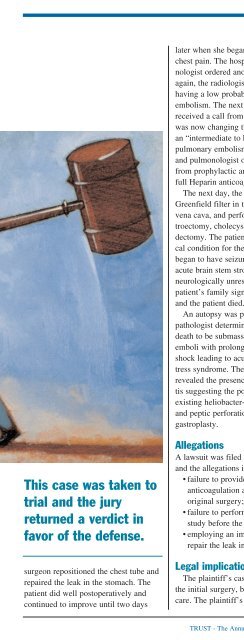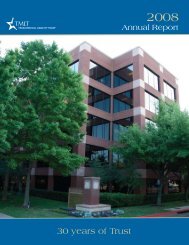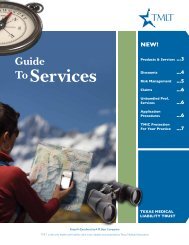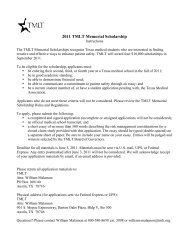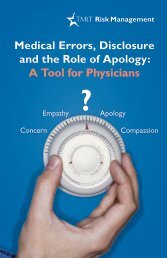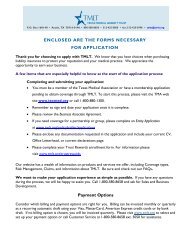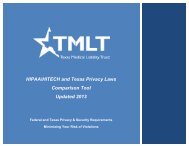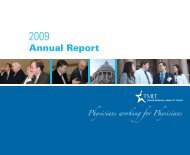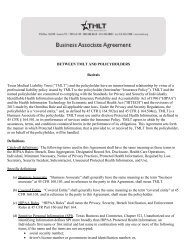Trust - TMLT
Trust - TMLT
Trust - TMLT
You also want an ePaper? Increase the reach of your titles
YUMPU automatically turns print PDFs into web optimized ePapers that Google loves.
This case was taken totrial and the juryreturned a verdict infavor of the defense.surgeon repositioned the chest tube andrepaired the leak in the stomach. Thepatient did well postoperatively andcontinued to improve until two dayslater when she began to complain ofchest pain. The hospitalist and pulmonologistordered another lung scan andagain, the radiologist read the scan ashaving a low probability for pulmonaryembolism. The next day, the hospitalistreceived a call from the radiologist whowas now changing the report to indicatean “intermediate to high probability ofpulmonary embolism.” The hospitalistand pulmonologist ordered a changefrom prophylactic anticoagulation tofull Heparin anticoagulation.The next day, the surgeon placed aGreenfield filter in the patient’s inferiorvena cava, and performed a total gastroectomy,cholecystectomy and appendectomy.The patient remained in criticalcondition for the next two days. Shebegan to have seizures, suffered anacute brain stem stroke, and becameneurologically unresponsive. Thepatient’s family signed a DNR orderand the patient died.An autopsy was performed and thepathologist determined the cause ofdeath to be submassive pulmonaryemboli with prolonged heart failure andshock leading to acute respiratory distresssyndrome. The findings alsorevealed the presence of chronic gastritissuggesting the possibility of preexistingheliobacter-induced gastritisand peptic perforation following thegastroplasty.AllegationsA lawsuit was filed against the surgeonand the allegations included:• failure to provide prophylacticanticoagulation at the time of theoriginal surgery;• failure to perform a barium swallowstudy before the gastroplasty; and• employing an improper technique torepair the leak in the stomach.Legal implicationsThe plaintiff’s case did not focus onthe initial surgery, but the postoperativecare. The plaintiff’s expert was criticalof the surgeon for not performing a bariumswallow before the second surgery.This would have revealed the leak andwould have allowed it to be repairedearlier. Though the cause of death waspulmonary emboli, it was the opinion ofthe plaintiff’s expert that the patient’sinfection led to the pulmonary emboli.He could not offer any explanation asto how this occurred. The expert statedthat it was not reasonable to rely on apulmonologist who was saying thepatient had a low probability of pulmonaryemboli.Defense consultants were supportiveof the surgeon’s care in this case.Though a leak did occur, the bariumswallow performed four days after thegastroplasty negated the possibility thata tear occurred during the surgery. Theexperts believe the leak occurredbecause of the patient’s pre-existinggastritis.The cause of death was pulmonaryembolism, not infection. Regarding theplaintiff’s claim that the infection led tothe pulmonary emboli, defense expertsindicated this was a “ridiculous statement,”and that there is a “mountain ofliterature” to dispute this. The consultantsurgeons also stated that it was reasonablefor the surgeon to rely on thehospitalist and pulmonologist who werefollowing the patient’s pulmonarystatus.DispositionThis case was taken to trial and thejury returned a verdict in favor of thedefense.Risk managementconsiderationsThe <strong>TMLT</strong> claim department has identifiedpatient selection, informed consentand postoperative follow up asprevalent issues in lawsuits allegingmalpractice before, during, or after surgicalweight reduction procedures.TRUST - The Annual Report Magazine19


